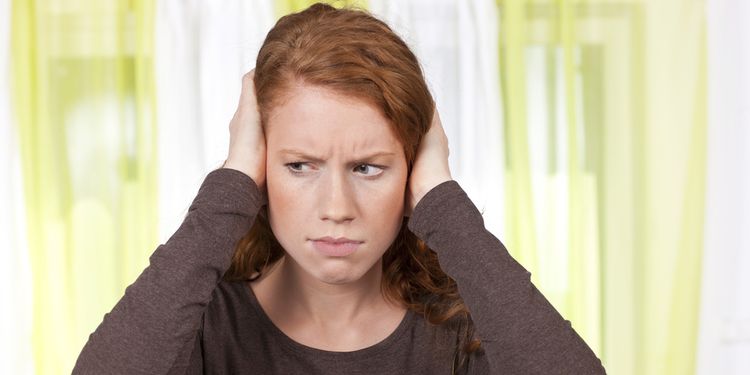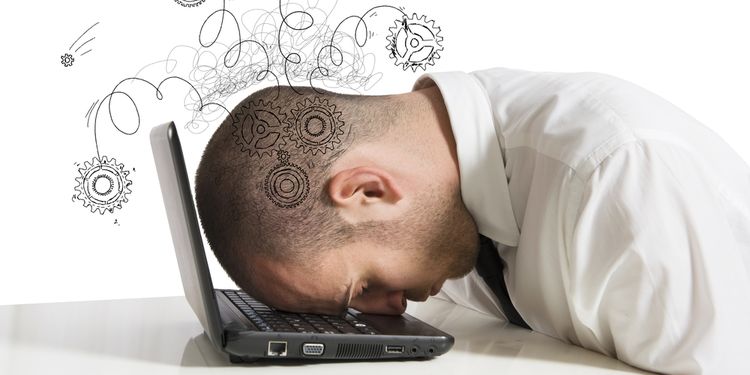Why You’re Experiencing Dizziness

Dizziness. It’s enough to make your head spin! Everyone experiences dizziness at some time or another, especially as children, running around in circles or riding rides at a carnival that spin, loop, twist, and turn.
Dizziness is a subjective experience that can’t be objectively measured. It can be described as a spinning sensation inside the head or as though the surrounding environment is spinning. It can also be described as feeling unbalanced or unstable, lightheaded, or feeling faint.
What Exactly is Dizziness?
Dizziness is the feeling of being lightheaded, weak, faint, or unstable. It affects the sensory organs, specifically the eyes and ears, as well as the brain. Dizziness is common and affects approximately 20%-30% of the general population.1
It’s usually not serious, but when dizziness causes fainting or loss of balance, it can lead to falls and other injuries.
Dizziness can be dangerous if it occurs while driving, operating heavy machinery, or if it is related to a serious condition. Dizziness can occur in people of all ages, but it is more common among older adults.

How Does Dizziness Occur?
Motion-based dizziness results from movements like spinning, whirling, twisting, and rotating that can cause asymmetry in the signals that come from the vestibular system (a sensory system located in the inner ear compartments that provides a sense of balance). This alteration leads to the sensation known as dizziness.
Sometimes the dizziness is provoked, like on a carnival ride, but dizziness can also occur as an unprovoked and episodic or constant occurrence. When dizziness is provoked it is expected, but when unprovoked it can be a source of distress for the person experiencing it and indicate an underlying condition.
Dizziness can also occur as a result of infection and inner ear disorder. Inflammation, fluid build-up, or injury to the inner ear structures including the nerves, ossicles (bones), canaliths/otoliths (ear crystals that play a role in balance) or the vestibular system may produce dizziness since these structures control balance and equilibrium by relaying signals to the brain about the body and head position relative to gravitational forces.
Metabolic causes may also result in dizziness. Low blood sugar, low blood pressure, low oxygen levels, dehydration, or anemia are common culprits. Metabolic causes stem from decreased blood flow and oxygen to the brain. When this occurs, the natural response is for your body to feel dizzy and/or faint since you have increased blood pressure and blood flow to the brain when you are lying down. Similarly, anxiety and depression can provoke dizziness since the metabolic changes associated with it can cause decreased blood pressure and oxygen to the brain as well. Many medications elicit the same response.

Symptoms of Dizziness
Symptoms of dizziness include feelings of being:
- Faint
- Woozy
- Unsteady
- Wobbly
- Weak
Sometimes dizziness is accompanied by:
- Nausea and/or vomiting
- Headache
- Loss of coordination
- Hearing loss
- Ringing in the ears

Types of Dizziness
Dizziness occurs when our sense of balance is off. The first step in determining the cause of dizziness is to determine what the individual is experiencing. It is often a result of vertigo, but dizziness can also be caused by an inner ear problem. The most common types of dizziness are vertigo, disequilibrium, presyncope, and lightheadedness.
Vertigo: The sensation that you or your surroundings are spinning or whirling. Remember that feeling when you got off of the merry-go-round? That’s what vertigo feels like. You may feel as though you are spinning, falling, or off-balance. You may have trouble walking or standing, and you may lose your balance. With severe vertigo you may feel nauseated or vomit. It is defined as “an illusion of movement caused by asymmetric involvement of the vestibular system.”2
Vertigo is a reflection of dysfunction of the vestibular system and can be further divided into central vertigo and peripheral vertigo. Central refers to conditions of the central nervous system, brain, and spinal cord. These conditions primarily include strokes, Parkinson disease, tumors, or trauma.3
Peripheral vertigo results from the balance nerves and organs in the inner ear. It is the more common vertigo and can be caused by amyloidosis, diabetes, alcohol, tumors, trauma, infections, migraines, allergies, and inner ear fluid abnormalities.3

Benign paroxysmal positional vertigo (BPPV): Caused by the dislodging of otoconia, also known as ‘ear rocks.’ When these calcium crystals in the inner ear become displaced you feel dizzy. This is the most common form of vertigo and causes short-term episodes of dizziness initiated by sudden head movements, like when turning over in bed or moving from a standing to lying position.4
Meniere’s disease: A disorder of the inner ear that causes a buildup of fluid and is characterized by dizziness, ringing in the ears, and hearing loss.4

Vestibular neuritis: A viral infection of the vestibular nerve.5 The vestibular nerve carries information from the inner ear about head movement. When one of the two vestibular nerves is infected, there is an imbalance between the two sides, resulting in vertigo.
Inflammation: In the inner ear, inflammation is known as labyrinthitis and is a combination of the symptoms of vestibular neuritis, with the addition of hearing loss.6,7
Migraine-associated dizziness (vestibular migraines): Considered to be the second most common cause of vertigo and the most common cause of spontaneous episodic vertigo. In addition to dizziness, episodic attacks include symptoms such as nausea, photophobia, phonophobia, and sensitivity to head movement. Approximately 10% of Americans are afflicted with this disorder, women more commonly than men.5

Presyncope: The sensation of passing out. This causes a feeling of faintness that occurs while standing and is alleviated by lying down. It is usually cardiovascular-related. Cardiovascular causes of dizziness include arrhythmias, myocardial infarction, carotid artery stenosis, and orthostatic hypotension.
Orthostatic hypotension is the most common cause of presyncope and is associated with diseases that have an inability to compensate for changes in the body’s position (autonomic dysfunction) such as diabetes, Addison’s disease, and Parkinson’s disease.
Orthostatic hypotension: A drop in blood pressure when sitting up or standing too quickly, causing decreased blood flow to the brain. Orthostatic hypotension occurs in about 20% of the elderly and is more common among people with coexisting disorders, especially hypertension.9 Postprandial orthostatic hypotension is also common. It causes a decrease in blood pressure following a meal. It is thought to be caused by the insulin response in high-carbohydrate meals and is worsened by alcohol.1
Postural orthostatic tachycardia syndrome (POTS): Another disorder in which reduced blood volume returns to the heart after standing up from a lying down position. In POTS, the feeling of faintness is also accompanied by an increase in heart rate (tachycardia). Many medications can cause presyncope, including cardiac medications such as alpha/beta blockers, angiotensin-converting enzyme inhibitors, diuretics, and nitrates; central nervous system medications like antipsychotics, opioids, muscle relaxants, and antidepressants, and urologic medications—namely phosphodiesterase type 5 inhibitors and urinary anticholinergics.

Disequilibrium: Involves a feeling of loss of balance, instability, or feeling “wobbly” and affects walking. The sensation can be caused by inner ear or vestibular problems, sensory disorders, joint or muscle problems, neurological problems, or medications.11
Disequilibrium is common following a stroke. It can also be caused by cervical spondylosis, a type of arthritis in the neck which puts pressure on the spinal cord; neurological disorders such as Parkinson’s disease; disorders involving the cerebellum, which is responsible for balance; diseases such as diabetes, and metabolic disorders such as hypothyroidism and hypoglycemia.
Lightheadedness: A vague sensation that you are about to faint. You may feel dizzy, but you do not feel as if your surroundings are moving. You may feel nauseated or vomit. It usually goes away if you lie down. Psychiatric disorders such as depression, anxiety, and panic disorders can cause lightheadedness.12 Hyper- and hypoventilation (taking in too much or too little oxygen) changes the carbon dioxide levels in the blood, which can cause anxiety-like symptoms, such as dizziness.13 Depression and alcohol intoxication have also been found to overlap with dizziness.14

Root Causes of Dizziness
Dizziness can have multiple triggers and root causes. Some of the most common triggers are blood pressure and volume changes, migraines, and poor blood sugar regulation.
Blood Pressure: When blood pressure is too low (hypotension), not enough oxygen-rich blood is being delivered to the brain, and brain function can be affected. High blood pressure (hypertension) can be asymptomatic, but some people develop headache, nausea, and dizziness.
Maintaining blood flow to the brain is dependent on blood volume. Decreased blood volume affects blood pressure and can cause dizziness. Blood volume changes can be due to:
Anemia: When a person’s blood contains a lower than normal amount of red blood cells (RBCs), they can develop anemia, which can result in dizziness. Blood loss is the most common form of anemia, but as Dr. Andrew Weil, MD explains, “A person can also develop anemia when their diet is low in vitamin B12, iron, and folic acid.”17
Dehydration: Occurs when you lose more fluid than you drink, causing the organs, cells, and tissues to function abnormally. Your body regularly loses water through sweating and urination. If the water is not replaced, you become dehydrated. Dehydration often occurs with infections that cause diarrhea, vomiting, or fever, as well as exercise or activity that can cause excessive sweating.
Migraines: Dr. Ronald Hoffman, MD believes anxiety and stress are the most common triggers of headaches and migraines that can result in dizziness.15 Dr. Weil also believes fatigue, too much sleep or not enough sleep, skipping meals, changes in barometric pressure or altitude, and strong odors can also trigger migraine symptoms.16 Migraines are also influenced by food sensitivities and hormonal imbalances. Migraines occur when there is an imbalance in brain chemicals or an inflammatory response that causes swelling to the blood vessels in the brain.

Blood Sugar Dysregulation: Low blood sugar (hypoglycemia) is a condition that occurs when blood sugar (glucose) is too low. Changes in plasma glucose level concentrations can cause dizziness. Low blood sugar is common in people with diabetes who take insulin or other medicines to control their diabetes.
Taking too much medication, skipping meals, eating less food than normal, or exercising more than usual can lead to low blood sugar. In people who do not have diabetes, low blood sugar may be caused by drinking alcohol, medications, medical conditions such as heart, kidney or liver failure, infections that affect the whole body, a tumor in the pancreas that produces excess insulin, and endocrine disorders.
Dr. Hoffman believes an excess of sugars and carbohydrates in the diet can lead to hypoglycemia.18 Symptoms of low blood sugar can occur suddenly and include dizziness or lightheadedness.19
High blood sugar (hyperglycemia) causes our kidneys to try to remove the excess glucose from the blood and excrete it in the urine, which can lead to decreased hydration in the body and may also cause dizziness. High blood sugar levels occur when there isn’t enough insulin available to move glucose into your cells. The most common cause of hyperglycemia is diabetes, but other conditions include infections, illness, medications, and hormone imbalances.20
These causes (migraines, blood pressure, anemia, dehydration, and blood sugar dysregulation) most often have an even deeper root cause, which may be related to diet, hormone imbalances and medications.

Root Cause of Dizziness: Diet
Certain food sensitivities can lead to migraines, which can result in dizziness. Common foods that Dr. Weil says can trigger migraines are aged cheeses and foods containing cheese, processed meats, peanuts, beans, peas, lentils, caffeinated beverages, chocolate, tobacco, and wine.
Other foods linked to migraines include bananas, citrus fruits, figs, raisins, plums, raspberries, fermented foods, and some fish.
Food additives, such as nitrites and nitrates found in processed meats, as well as food colorings and monosodium glutamate can also trigger migraines.28
Dr. Hoffman agrees that dietary allergies play a major role in the onset of headaches and their resulting dizziness and cites casein, histamine, tyramine, and yeast in addition.29
Food allergies can also cause migraines, an underlying condition of dizziness. According to Dr. David Perlmutter, MD and functional medicine neurologist, the two main food allergies related to migraines are gluten and dairy, and Dr. Amy Myers, MD maintains that 56% of people diagnosed with migraines actually had an underlying gluten sensitivity.30,31
Dr. Mark Hyman suggests eliminating dairy, gluten, corn, eggs, soy, and nuts as a means to determine source of food allergies and the possible root cause of your dizziness.32
The immune response and inflammatory reactions to the foods generate chemicals that cause swelling and irritation to the blood vessels of the brain, which may also cause dizziness.
Root Cause of Dizziness: Hormone Imbalances
Hormone imbalances can include any hormones in the body, including sex, thyroid, and adrenal hormones, which can all be linked to migraines and dizziness.
Changes in hormone levels affect circulation and blood vessels, resulting in dizziness.
Sex Hormones: For women, the constantly changing levels of progesterone and estrogen that fluctuate throughout the monthly cycle, menstruation, and menopause can cause an imbalance if this delicate process is altered. When something interferes with this cycle, specifically the use of birth control pills, pregnancy, estrogen-replacement drugs, or dietary/toxic sources of estrogen, a hormone imbalance can occur. A lack of estrogen and/or a deficiency of progesterone (which can cause estrogen excess) can produce dizziness.
Thyroid: Abnormalities of thyroid gland function due to increased or decreased thyroid hormone levels caused by inflammation, autoimmune diseases, metabolic defects, or nutritional deficiencies are another cause of hormone imbalances.33
Hyperthyroidism: Too much thyroid hormone can cause palpitations, shortness of breath, and lightheadedness.
Hypothyroidism: Too little thyroid hormone can cause low blood pressure and decreased heart rate, leading to weakness, lethargy, and lightheadedness.

Adrenal and Stress Hormones: Everyone experiences stress and anxiety from time to time. Stress can be physical, emotional, mental, or the presence of a stressful event such as a move, the death of a friend or family member, having a baby, or getting married.
Stress changes the hormone levels in the body, including corticotropin releasing hormone (CRH), catecholamines (adrenaline and noradrenaline), cortisol, and thyroid hormones.
When hormone levels change, so do blood sugar levels and blood pressure, both of which can cause dizziness. Long-term exposure to stress may have harmful consequences leading to various endocrine disorders such as diabetes, thyroid disease, osteoporosis, and more.34
Drugs that contain stimulants, like thyroid medications, asthma inhalers, and diet pills, may exacerbate symptoms of stress and anxiety, and regular use of caffeine, cocaine, and alcohol can also make symptoms worse. Other causes of stress are lack of sleep and poor diet.
Adrenal fatigue: Produced when your adrenal glands can’t adequately meet the demands of stress. Your adrenals control your body’s response to stress by releasing hormones like cortisol, epinephrine (adrenaline), and norepinephrine (noradrenaline) that regulate your reaction to stress as well as control blood sugar levels and blood pressure—these are some of the main contributors to dizziness.
When the adrenal glands are overstimulated for long periods of time, they begin to weaken and function below their optimal level. In addition to psychological and emotional stress, such as financial burdens, job changes, lack of sleep, poor diet, and the typical challenges of daily life, Chris Kresser, LAc, MS notes other forms of stress that can burden the adrenals, including blood sugar imbalances, food intolerances, environmental toxins, gut dysfunction, chronic infections, autoimmune disorders, and inflammation.35 Weak adrenals lead to a variety of symptoms, including dizziness upon standing.

Root Cause of Dizziness: Medications
Dizziness is often a side effect of medications used to control blood pressure and heart rate.
Beta blockers block adrenaline receptors in the heart and may limit the ability of the heart rate to increase in response to changes in position, decreased RBC count, or dehydration. Nitroglycerin, used for angina pectoris, causes blood vessels in the heart to dilate. However, other blood vessels in the body also dilate, which decreases blood pressure.
Medications for erectile dysfunction can also decrease blood pressure. Diuretics can cause dehydration. Other medications that can cause dizziness are antibiotics, antihypertensives, anti-inflammatories, antidepressants, and anti-anxiety drugs, as well as heavy metals such as arsenic and mercury.36

Natural Relief from Dizziness
Lifestyle and dietary modifications, herbal supplements, and at-home remedies can often help control dizziness, but treatment focuses on the underlying cause.
Avoiding rapid changes in body position may help prevent dizziness. If it does occur, lying down will allow more blood to flow to your brain. After lying down, slowly sit up and remain seated for 1 to 2 minutes before slowly standing up—this can often help.
Vertigo caused by Benign Paroxysmal Positional Vertigo (BPPV) may be treated by a repositioning technique. The Epley maneuver is an at-home repositioning technique that redistributes the free-floating particles, usually calcium carbonate, in the inner ear.21 This technique can also be performed by a trained healthcare provider.
Vertigo caused by Meniere’s disease may require salt restriction, avoidance of caffeine and alcohol, and stress reduction. Too much sodium can increase the fluid build, or endolymphatic hydrops, making the symptoms worse and causing vertigo.
Lightheadedness caused by hyperventilation may be alleviated by breathing control exercises, such as rebreathing into a paper bag.

Eating a diet high in fresh fruits and vegetables, lean proteins, and healthy fats and low in sugar and processed foods can help stabilize blood sugar and blood pressure.
Dietary changes can also decrease your risk of cardiovascular disease and the need for medications, which can be a cause of vertigo.
When dizziness is due to stress, exercises such as yoga and meditation can help reduce stress and anxiety.22 Dr. Amy Myers recommends adaptogenic herbs for helping the body adapt and cope with stress —this includes herbs like rhodiola, ashwagandha, and holy basil.23
Antioxidants such as Vitamin C, Vitamin E, lipoic acid, and glutathione help weaken the damaging effects of free radicals and have been shown to help alleviate dizziness associated with vertigo.24
Liz Lipski recommends black cohosh for hormone imbalances associated with PMS.25
Dong quai, chasteberry, maca, wild yam, lemon balm, and burdock can also be useful in balancing hormones.
Licorice can help raise low blood pressure, reducing the risk of dizziness according to Dr. Weil. He also recommends ginkgo biloba, which increases blood flow to the brain, helping to reduce the symptoms of vertigo.26, 27
Ginger can help relieve motion sickness, nausea, and dizziness associated with vertigo.24
As you can see, there’s no shortage of natural relief options to try out. The aforementioned suggestions are healing, not masking, as they address the underlying causes of dizziness. So if you’d like the spinning to stop, give these measures a go. Improving your nutritional and lifestyle habits will benefit you in the long run.
